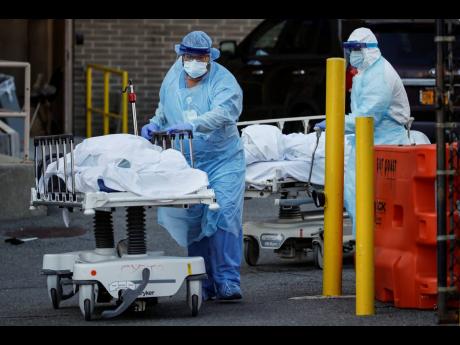‘People are dying around me every day’ - Worried Jamaican healthcare workers battling COVID-19 in NYC
WHEN TWO young women left Jamaica and migrated to the United States (US), never in their wildest dreams did they envision that one day, they would be working on the front lines, trying to save lives during a global pandemic like the new coronavirus.
Jamaicans Shavon Josephs, 30, a patient-care associate, and Nordia Bailey, 25, an emergency medical technician, are two persons who make up the thousands of health workers who are burdened by the number of people made critically ill by the coronavirus outbreak in New York City.
As of 4:00 yesterday afternoon, at least 131,569 confirmed cases of the coronavirus had been discovered in the state, including more than 72,000 in New York City.
At least 4,758 people who have being infected with COVID-19 have died in the state, which has the largest number or around 44.5 per cent of confirmed cases in the US.
Josephs, who is from Ocho Rios in St Ann, works at the Long Island Jewish Medical Center, and told The Gleaner that nursing is her passion and she loves to help people, but since the outbreak of COVID-19, things have been different.
“It took a turn in February, when the coronavirus came out and reached the US. I’m scared to work ... . I don’t want to be at work because most of my co-workers are infected with the virus. Work is not the same anymore,” Josephs said.
She gets sad caring for patients who have the virus.
For Bailey, a first responder for Senior Cares, located in the Bronx, travelling back and forth in the ambulance reminds her that one day she may not go home.
“Each time the dispatcher sends us a call and it comes in as COVID-19, it hits different. Your heart skips a beat, you start to fret. It’s like a whole different feeling comes over your body. In your mind, your thinking is, is that going to be us one day? Are we going to be in that same position?” she told The Gleaner.
More dead patients than live ones
Bailey, who is from Portland, said she is tasked with performing life-saving techniques en route to the hospital before transferring care to higher-level persons.
She told The Gleaner that she is seeing far more dead patients than live ones at the moment.
“We are going in, dead bodies are coming out ... . It’s a scary sight. Really a scary sight, and what I am seeing now, we are running out of space to the point where dead patients and live patients are in the same room … . It’s crazy!” she said.
Joseph said she has been working long hours because colleagues are sick and cannot show up for work.
“No one is showing up to work, I’m getting mandated to do a 16-hour shift because of shortage of staff, when I’m supposed to be doing only eight hours,” she said.
Both ladies complain bitterly about the personal protective equipment (PPE) and maintaining their own health and safety.
“I have to put my health first. We’re not getting the proper gear to care for these patients. People are dying around me every day. This virus is very serious,” Josephs said.
“We do not have adequate PPEs. Right now, the only PPE we wear as first responders are goggles, gloves and masks, because we do not have gowns. If we do have gowns, we have to save them for when we are doing CPR [cardiopulmonary resuscitation] or intubating … . Other than that, it’s just our uniforms; so this is where we have to be extremely careful after each call,” Bailey told The Gleaner.
The ladies told our news team that while they love their jobs, no teaching or training prepared them for today’s fight.
“I don’t think the training that we got in school prepared us for this, because there’s no cure for this virus,” Josephs said.
Bailey, who has been in the field for over a year, said her training definitely did not groom her for COVID-19.
“It’s more than a gunshot; it’s more than a stab wound; more than a collision. This is completely different. It is a virus that is wiping out the entire nation; no one was prepared for this,” she said.
Josephs said she has not cared for any Jamaican. However, she came across a married couple who are Jamaicans and were confirmed with the virus.
“I interacted with one Jamaican lady whose husband was diagnosed with the coronavirus. She later went and got tested and was also positive for the virus,” Josephs told The Gleaner.
Family time is precious for both ladies.
Worried about children
Josephs is worried for her daughter, while Bailey is missing her son, whom she goes days without seeing since the COVID-19 outbreak.
“It’s crazy. Because I leave for work early, I don’t see my son or my son doesn’t see me, and when I get home, he is sleeping; and the cycle goes on for another day or two. It’s affecting family time a lot, but you gotta do what you gotta do,” Bailey told The Gleaner.
Both Bailey and Josephs are yearning to see the back of this virus and are asking everyone, even Jamaicans back home, to stay home and help other first responders in their fight against COVID-19.
“I’m asking people to follow the rules and stay home. It saves lives. I just can’t wait for this pandemic to be over so I can go back to my normal life,” Josephs said.



